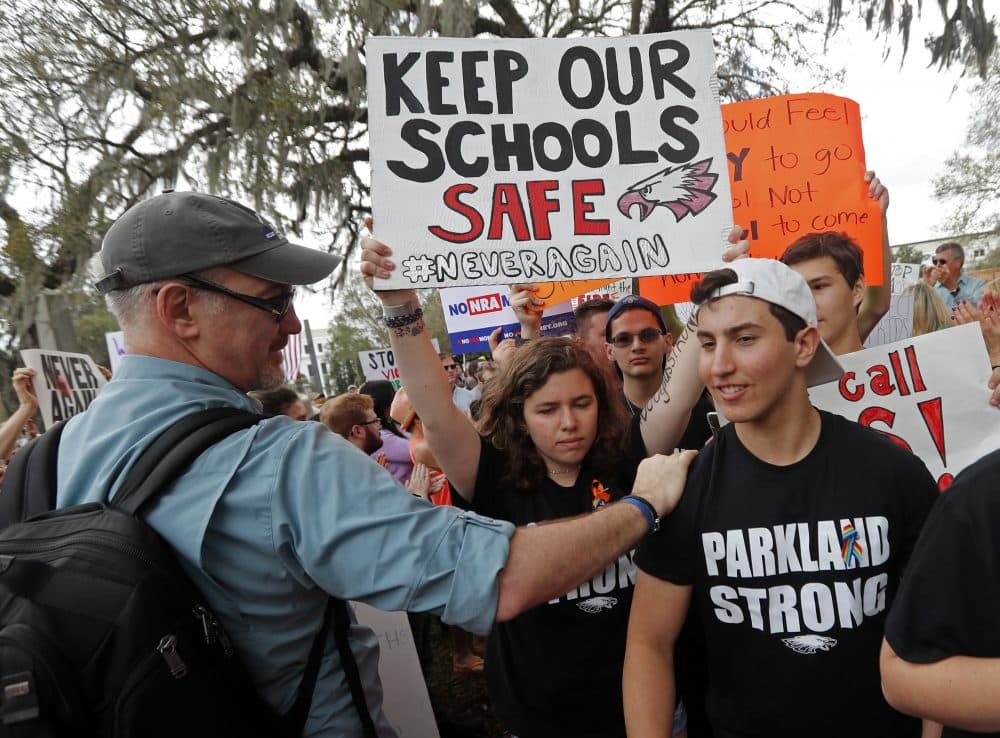Advertisement
Commentary
25 Years After Her Mentor’s Murder, A Woman Fights For These 9 Actions On Guns

Nearly 25 years ago, when I was 27, a mass shooting forever altered my life. A gunman with a semi-automatic TEC-9 killed eight people and injured six more at a law firm located at 101 California St. in San Francisco. I wasn’t working that day. But my mentor, Jack Berman, and our client, Jody Sposato, died, shot dead in the firm’s conference room. If I hadn’t been on vacation with my family, I probably would’ve been with Jack and Jody.
Congress enacted the Federal Assault Weapons Ban in September 1994, in large part due to the efforts of the families and friends of the victims of the San Francisco shooting. I know the Parkland community can effect change, too.
I’ve been thinking about how we can stay safer from guns for a lifetime. Below are nine action steps that would help.
- The low-hanging fruit. Suspected terrorists on the FBI watch list who aren’t allowed to fly shouldn’t be allowed to purchase guns. "Bump stocks” that convert legal semi-automatic weapons to fire at essentially the rate of illegal fully automatic weapons must be banned. The arguments for these proposals are self-evident.
- Universal background checks must be enhanced. Convicted felons, domestic abusers and people with severe mental illness shouldn’t be able to purchase guns. We must ensure that the federal background check database is complete by requiring all state and government agencies to provide data. (The shooters in Sunderland Springs in 2017 and Virginia Tech in 2007 could have been prevented from obtaining their weapons legally if the federal database had been complete.) Congress and President Trump can also reinstate the Obama-era regulation, repealed last February, that would have made it harder for people with mental illnesses to obtain a firearm. Finally, background checks must be extended to cover all secondary markets, such as gun shows and internet sales. A recent study published in the Annals of Internal Medicine found that 22 percent of current U.S. gun owners who acquired a firearm within the previous two years did so without a background check.
- Reject the call to arm teachers. The NRA would like to increase gun manufacturers' profits by selling us all more guns. However, as Everytown For Gun Safety says, “if more guns in more places made us safer, the US would be the safest country on Earth.” Instead, America’s gun homicide rate is more than 25 times the average of other high-income countries. Rather than making us safer, studies have found that living in a home where guns are kept increases an individual’s risk of death by homicide by at least 40 percent and death by suicide by at least 90 percent.
- Reinstate the Federal Assault Weapons Ban, including limiting high capacity magazines. A group of Sandy Hook first graders ran to safety only when the gunman stopped shooting to reload his 30-round magazine. We need a consistent federal standard. As a nation we are only as “safe” as the most lenient state law, since guns and ammunition clips are easily transported across state lines. If the federal government regulates things like food safety, why not guns and ammunition clips?
- Increase funding for mental health treatment. President Trump’s recent budget blueprint, which proposes a combined cut of $1.1 billion to the the National Institute for Mental Health and Substance Abuse/Mental Health Administration, takes us in the wrong direction. We should resist demonizing mental illness, since the overwhelming majority of mentally ill people are not violent. In fact, less than 5 percent of all gun homicides from 2001-2010 were caused by mentally ill people.
- Expand “Red Flag Laws.” These laws establish a civil procedure for temporarily removing guns from people who are found to be a significant danger to themselves or others. Currently five states have such extreme risk protective order laws. Several states, including Massachusetts, were already considering such laws before the Parkland tragedy and Sen. Dianne Feinstein, of California, introduced a bill supporting a federal Red Flag Laws last May.
- Fully fund research into the causes of gun violence. It’s time to repeal the 22-year-old Dickey Amendment, which bans all government-funded research into gun violence. The more we are able to scientifically understand the causes of gun violence, the better we will be at combating it.
- End the broad legal immunity for gun manufacturers and dealers. Congress gave immunity to gun manufacturers and dealers in 2005. The gun industry should be subject to the same civil liability laws as nearly all other American products, since such laws are an important check on irresponsible manufacturers and sellers.
- Expand state initiatives. Studies show that states with the most gun control laws have the fewest gun-related deaths. Such initiatives include increasing the minimum age for purchasing a gun; increasing licensing/safety training for gun ownership, similar to that for driving a car; requiring a five-10 day waiting period on a gun purchase; limiting the number of guns an individual can purchase each month; requiring gun owners to purchase liability insurance similar to car insurance; and encouraging “smart gun” technology that won't fire until the gun is unlocked with a fingerprint or other identifier, like our smart phones.
Soon after the shooting at 101 California St., I started having panic attacks. I had trouble stepping out of elevators because I was too fearful about what might be waiting outside. To this day, I fear having my back to a large window because Jack and Jody didn’t see the gunman coming — their backs were to the glass wall the gunman shot through.
Over the last 25 years, I’ve learned to manage my fear. Senseless tragedies and gun violence will continue, but we can curb some of the deadliness if we stand together on sensible reforms.
